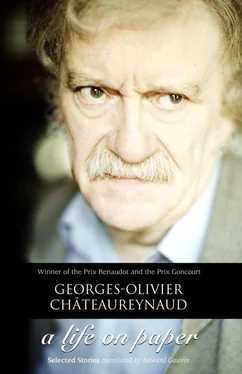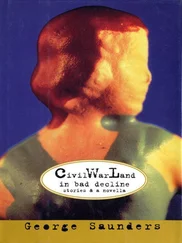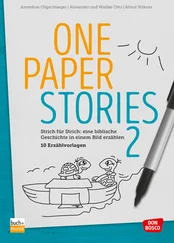Georges-Olivier Chateaureynaud - A Life on Paper - Stories
Здесь есть возможность читать онлайн «Georges-Olivier Chateaureynaud - A Life on Paper - Stories» весь текст электронной книги совершенно бесплатно (целиком полную версию без сокращений). В некоторых случаях можно слушать аудио, скачать через торрент в формате fb2 и присутствует краткое содержание. Год выпуска: 2010, Жанр: Современная проза, на английском языке. Описание произведения, (предисловие) а так же отзывы посетителей доступны на портале библиотеки ЛибКат.
- Название:A Life on Paper: Stories
- Автор:
- Жанр:
- Год:2010
- ISBN:нет данных
- Рейтинг книги:4 / 5. Голосов: 1
-
Избранное:Добавить в избранное
- Отзывы:
-
Ваша оценка:
- 80
- 1
- 2
- 3
- 4
- 5
A Life on Paper: Stories: краткое содержание, описание и аннотация
Предлагаем к чтению аннотацию, описание, краткое содержание или предисловие (зависит от того, что написал сам автор книги «A Life on Paper: Stories»). Если вы не нашли необходимую информацию о книге — напишите в комментариях, мы постараемся отыскать её.
A Life on Paper
A Life on Paper: Stories — читать онлайн бесплатно полную книгу (весь текст) целиком
Ниже представлен текст книги, разбитый по страницам. Система сохранения места последней прочитанной страницы, позволяет с удобством читать онлайн бесплатно книгу «A Life on Paper: Stories», без необходимости каждый раз заново искать на чём Вы остановились. Поставьте закладку, и сможете в любой момент перейти на страницу, на которой закончили чтение.
Интервал:
Закладка:
He had no memory of the days and nights that passed. Then the fires the fever had stoked in his body went out one by one, and the black smoke they'd thrown off stopped clouding his mind. The morning came when he could step outside and walk all the way to a nearby pond. He leaned over the water and looked at his reflection between the ribbons of scum on the surface. Though thinner than ever, his hair and beard whiter than expected, it was still him, and he laughed to find himself alive. He heard a gentle voice call out to him, and rose, blushing.
"Sir knight! Sir knight! You're on your feet again!"
Today it was her cheek that was smudged with soot. He remembered their first encounter, and couldn't keep himself from laughing again. Beautiful, yes-but a coalwoman. Still-beautiful! He didn't know what to say to her and cleared his throat.
"You looked after me…"
"Yes, sir knight. A long time."
He misread her. "I'm sorry. My purse is empty."
She stopped smiling, and made as if to leave.
"Don't go! What have I said to offend you?"
"Do you think I'm interested in your money? Had you died, I could have taken it freely."
"Forgive me. I am old and poor, and sooner or later, the subject always comes up.
"You tire me."
She moved away. He returned to the hut, upset with himself. When night began to fall, he waited, but she did not come. He fell asleep late that night. That was how she was, the ruler of her little island, and that day he had displeased her. She did not come till the next day, after noon, bringing fish, four gleaming fish spotted green and blue, one of which still jerked among the blackberries she'd gathered along the way and tossed pell-mell into the wicker basket with her catch. They ate without speaking a word. When they'd finished, they went inside. There they shed their clothes and coupled. Then they fell asleep. Night was falling when they woke. They drank some broth and fought over the remaining blackberries before returning to their lover's sport, inventing new games to play.
They were the only two souls on the island. From time to time, said the coalwoman, boatmen stopped to buy some charcoal from her. The yard behind the hut was almost bare: they would not come again for a long while. The days went by. Slowly, Maxence recovered his forces. He no longer wore his coat of mail, but a simple serge tunic the young woman had sewn him. He helped make charcoal, and at night they lay down beside each other like husband and wife. Sometimes he was astonished that so young and beautiful a girl had given herself to him like this, and the woodsman's words came back to him. He had indeed found a strange companion. She spoke little, and some days behaved as if he didn't exist, coming and going or dreaming in the sun before their hut without giving him so much as a word or a glance. Sometimes she suddenly disappeared, and Maxence spent hours, days even, searching for her on the island. It wasn't very big, but the young woman only reappeared when she chose to.
She pretended not to know her age. Maxence teased her, saying that her childhood days could hardly be so long past, that she should remember them, and made as if to look for dolls beneath the bed. She replied in a serious voice that frightened him.
"Oh, but they are, they are! Long, long past! I no longer even remember ever playing with dolls!"
He asked her about her parents, and got no answer; if he insisted, she fled. He would only see her one or two days later, and then thought only of being forgiven for his tiresome questions. Unlike most young women he'd known, she cared not a whit in love for sweet words or vows. She gave and took without flowery phrases, then fell asleep with a smile on her lips. They never once had those lovers' conversations, which are really confessions, and Maxence, whom these had always bored, missed them for the first time, for his curiosity gnawed at him. One time, as he laughingly threatened to leave her, he caught her giving in to the silly nothings said in bed.
"If you leave this place;" she said, "no path will lead you anywhere. The world around this isle is empty:"
He pretended to play her game. "But then, my beautiful sorceress, what of your buyers, the boatmen? Doesn't the river lead them to the sea after they've stopped at your but?"
"Yes, because I wish it. You can leave; you are free to do so. Cut down branches and make a raft if you wish. But be warned: the river runs only between dead banks to an ocean of silence."
Maxence tried to lighten the mood. "My dearest, love makes a world without the one we love a wasteland!"
"It is not love, but I;" she said gravely, "who will make the world a wasteland for you"
She slipped away, as always when the conversation displeased her. Alone, Maxence went to check on the ovens. He looked up for a moment at the opposite shore and reflected that he'd never seen smoke rising where the woodsman's cottage should have been. No doubt he had misreckoned the length of his ride to the river the morning he'd left, and the next moment, gave it no more thought.
A short while later, winter came. All night, the wind howled round the hut like a hungry dog and in the morning, when the lovers stepped out, snapped at their hands and faces. The river would soon freeze. Already gray lace advanced from either side, just above the water, soon to meet and harden in the middle till the river could reliably be crossed on foot. Then it snowed for three days. The river vanished; frost after frost immobilized the landscape for several long months. Maxence complained of the cold and spoke to the coalwoman of distant climes he'd witnessed in his travels, depicting the golden lives they'd lead if she but agreed to follow him to those lands where the sun shone all year long. She listened to him, but never replied. He himself was uncertain if he wished to bring her along. He often coughed and felt suffocated at night. After his illness and convalescence, he had seemed, briefly, to recover his youth, but since winter's sudden start had felt himself growing older by the day. While his companion braved winter with a smile, his own temperament grew bitter. Eventually he no longer stepped outside, and spent his days by the fire, nursing memories of the Orient. One night at last, he realized he was an old man. He said so to the young woman, who pulled him close. No doubt he had a fever already, for she fell asleep first while he shivered at length in her arms before joining her. When dawn came he rose without waking her. Though he had not used his armor since arriving on the island, he had always taken care-an old campaigner's habit-to keep its pieces in good shape. He donned his armor, harnessed his horse, then mounted her and crossed the river. He went slowly, often getting off to help the creature, who sometimes sank to her chest in the snow. Beneath his helm he wept with cold. His tears froze to his face as soon as they welled from his eves. He soon realized he wouldn't make it far this way, but the hope of warming himself by the woodsman's fire restored his courage. He squinted at the icy air before him, expecting at any moment to see smoke from their hearth rising through the trees. He saw nothing of the sort, but suddenly, lifting his gaze once more toward the skies, recognized the two giant oaks: no tree in all the woods could have rivaled them in height. He took another look around him: he was standing in the clearing. The frozen spring, which he found easily, was proof. But there was no cottage. He dismounted and got on his knees, sifting through the snow for some trace. Though he dug through the snow with his own hands, nothing remained of the cottage. He stood up again. Considering the clearing, he tried with his mind to efface the snow and recreate the shapes and colors of the autumn forest he still remembered. He was unable to decide, in his confusion, if the attempt was conclusive. His head spun; he tried to get back in the saddle but an even more violent dizziness seized him and he had to give up. The snow had started to fall again, slowly at first, then in large flakes that the wind hurled into his face. He tried to catch his breath long enough to make the shelter of the trees, but his mount didn't give him time: she took fright in the white whirlwind and jerked hard on the bridle. His numb fingers failed to hold her back. She broke free, bucked once and knocked him back in the snow. He tried to get up again, but rose no higher than his knees. He saw his horse one last time, mad with fear, dashing out of reach. Crossing his arms over his dented chest, he let himself fall back. The first flake settled on his right pupil, which didn't flinch, then another fell, and then a hundred more as the snow filled his eyes and his wide-open mouth.
Читать дальшеИнтервал:
Закладка:
Похожие книги на «A Life on Paper: Stories»
Представляем Вашему вниманию похожие книги на «A Life on Paper: Stories» списком для выбора. Мы отобрали схожую по названию и смыслу литературу в надежде предоставить читателям больше вариантов отыскать новые, интересные, ещё непрочитанные произведения.
Обсуждение, отзывы о книге «A Life on Paper: Stories» и просто собственные мнения читателей. Оставьте ваши комментарии, напишите, что Вы думаете о произведении, его смысле или главных героях. Укажите что конкретно понравилось, а что нет, и почему Вы так считаете.












